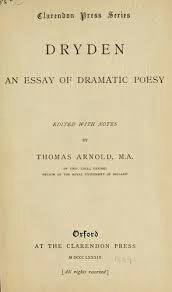Dryden's essay on dramatic poesy
This blog is based on Dryden's essay on dramatic poesy.This task was assigned by Dilip Barad sir.
Difference between Aristotle's definition of tragedy and Dryden's definition of play
Aristotle's definition emphasizes the importance of catharsis, or emotional purging, through the portrayal of tragic events. He believed that tragedy should evoke feelings of pity and fear, leading to a therapeutic release of emotions. This approach focuses on the emotional resonance of the story, creating a deeper connection with the audience.
On the other hand, Dryden's definition prioritizes the entertainment value of a play, emphasizing the importance of spectacle and dramatic twists while this approach can be engaging, it risks sacrificing depth and emotional resonance for the sake of entertainment.
Preference : Ancients vs. Modern
If i were to choose between Aristotle's and Dryden's definitions, i would lean towards Aristotle's perspective. Aristotle's focus on plot coherence, character development, and catharsis offers a timeless framework for understanding dramatic art. His emphasis on the emotional and moral impact of tragedy underscores its enduring significance. Aristotle's principles provide a solid foundation for evaluating dramatic works, ensuring that they resonate deeply with audiences by addressing universal human experiences and emotions.
Evaluating French vs. English
The debate between French and English plays often revolves around several points :
1. Portrayal of death and duel fights :
French plays, particularly those influenced by classical traditions, often present death and duel scenes in a more stylized manner, using blunted swords to avoid real violence. English plays, on the other hand, might depict these elements with greater realism, leading to a more intense dramatic experience. This can be seen as either a strength or a limitation depending on one's preference for realism versus theatricality.
2. Representation of large armies :
French theatre frequently employs elaborate stage techniques and symbolic representation to depict large armies, whereas English theatre might use a more literal approach. This can affect the audience's perception of scale and spectacle.
3. Mingling of mirth and serious tones :
Dryden's endorsement of blending genres contrasts with French classical norms, which often maintain a clear distinction between tragedy and comedy. This mingling can enrich the narrative, offering a multifaceted experience that captures a wider range of human emotions and situations.
4. Multiple plots :
Dryden's support for complex , multi- layered plots allows for richer narrative texture. French plays , adhering more strictly to classical unities, might favor simpler structures. The use of multiple plots can enhance dramatic depth and provide a broader exploration of themes.
Poetic vs. Prosaic dialogues
Regarding dialogue, i would prefer poetic dialogue in plays. Poetic language often enhances the emotional and aesthetic qualities of a play, creating a more immersive and evocative experience. It allows for greater expressiveness and can elevate the thematic content, offering audiences a heightened sense of the dramatic poetic dialogues can also contribute to the play's overall rhythm and musicality, enriching the theatrical experience.
Conclusion
In sum, Aristotle's focus on tragedy's emotional and moral impact provides a timeless framework for evaluating dramatic works. Dryden's modern perspective offers valuable insights into the evolution of drama and the incorporation of diverse elements. Both views contribute to our understanding of plays's form and function. Whether one prefers the classic poetic dialogue or the pragmatic prosaic approach, the rich traditions of both ancient and modern drama continue to inspire and challenge audiences worldwide.
References :
Dilip Barad. " An essay on dramatic poesy: John Dryden. Teacher Blog . 2012


Comments
Post a Comment